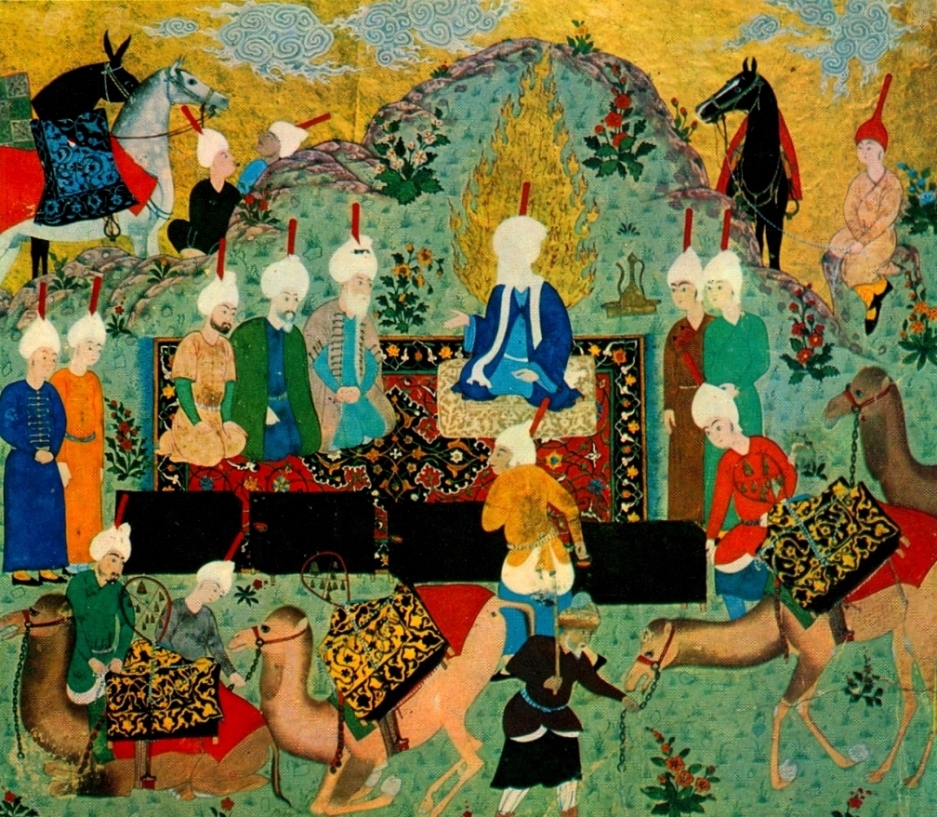Muhammad al-Baqir
 Muhammad ibn Ali al-Baqir (; ) was a descendant of the Islamic prophet Muhammad and the fifth of the twelve Shia imams, succeeding his father, Ali al-Sajjad, and succeeded by his son, Ja'far al-Sadiq. Muhammad's honorific title is short for , which means 'the one who splits knowledge open', a reference to his fame as a religious scholar.
Muhammad ibn Ali al-Baqir (; ) was a descendant of the Islamic prophet Muhammad and the fifth of the twelve Shia imams, succeeding his father, Ali al-Sajjad, and succeeded by his son, Ja'far al-Sadiq. Muhammad's honorific title is short for , which means 'the one who splits knowledge open', a reference to his fame as a religious scholar.Muhammad was born in Medina around 676 CE. In 680, when he was a small child, he witnessed the Battle of Karbala, where his grandfather Husayn ibn Ali and most of his relatives were massacred by the forces of the Umayyad caliph Yazid ibn Mu'awiya (). Upon his father's death around 712, Muhammad was recognized as the next imam by most followers of his father. These were the Imamites, the forerunners of Twelvers and Isma'ilis, which now constitute the majority of Shia Muslims. At the time, however, this quiescenct group was a minority compared to other rival Shia groups, who actively worked against the Umayyads. One such rival group were Zaydis. These followed Zayd ibn Ali, a much younger half-brother of al-Baqir, who staged an unsuccessful revolt shortly after al-Baqir's death. In contrast, like his father, al-Baqir was politically quiescenct but was nevertheless harassed by the Umayyads, especially by Caliph Hisham ().
Muhammad al-Baqir led a pious and scholarly life in Medina, attracting a growing number of followers, students, and visitors. He is credited with laying the doctrinal and legal foundations of Twelver Shi'ism during some twenty years of his imamate. He may also be regarded as the father of Isma'ili and Zaydi jurisprudence. Finally, he significantly contributed to Twelver exegesis of the Quran. Most of al-Baqir's disciples were based in Kufa, in present-day Iraq, many of whom later became outstanding Shia jurists and traditionists. Some of these, such as Zurara ibn A'yan, may have occasionally disagreed with al-Baqir, who disapproved of such independent views if they went beyond the general theological and legal framework provided by (Shia) imams. In Sunni Islam, al-Baqir is regarded as an authority in law and prophetic tradition, but portrayed as anti-Shia and proto-Sunni.
Muhammad al-Baqir died around 732, poisoned by the Umayyads, according to most Shia reports. He is buried in the Baqi' Cemetery in Medina, but the shrine that stood over his grave has been demolished twice by Wahhabis. Al-Baqir was succeeded by his eldest son, Ja'far al-Sadiq, who further developed Shia theology and law. Provided by Wikipedia
Showing 1 - 20 results of 31 for search 'Muhammad Baqir', query time: 0.05s
Refine Results
-
1
-
2
-
3
-
4
-
5
-
6
-
7
-
8
-
9
-
10
-
11
-
12
-
13
-
14
-
15
-
16
-
17
-
18
-
19
-
20